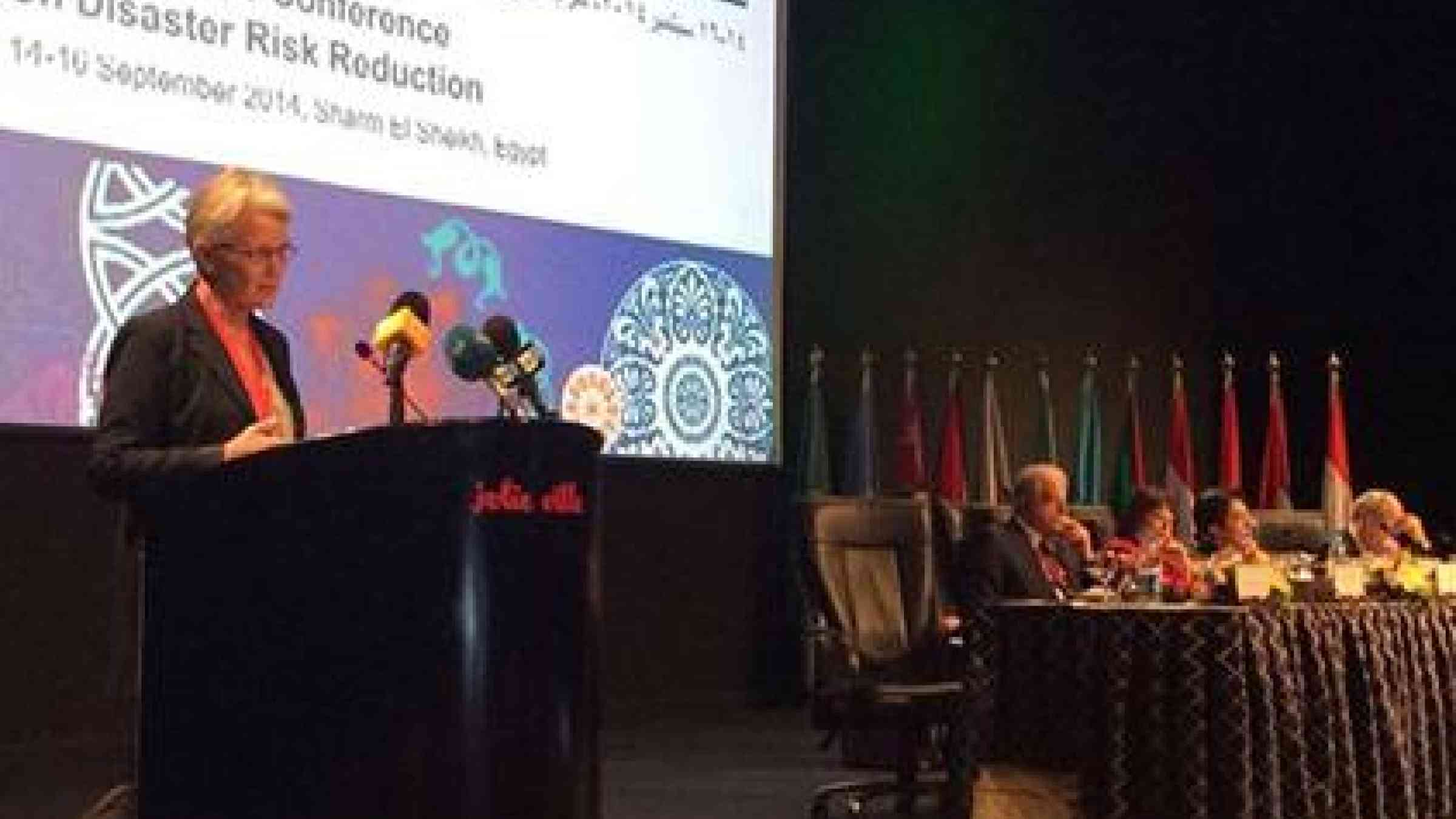Arabs meet on post-2015 HFA

SHARM EL SHEIKH, 15 September 2014 - UNISDR Chief, Margareta Wahlström, yesterday described the post-2015 development agenda as a “once in a lifetime opportunity” when she addressed the opening day of the Second Arab Conference on Disaster Risk Reduction.
She said the consultations that have taken place throughout the Arab world on the post-2015 framework for disaster risk reduction were further evidence of the very strong acceptance there now is for disaster risk reduction as part of the sustainable development agenda.
Hosted by the Egyptian government, some 400 delegates, including representatives from 19 Arab States, have come together for three days to debate the region’s implementation of the existing blueprint for disaster risk reduction, the Hyogo Framework for Action, and recommendations for its revision at the Third World Conference on Disaster Risk Reduction in Sendai, in March, 2015.
Ms. Wahlström recalled that the region experiences drought, floods and sandstorms on a regular basis. In fact, over the last 30 years there have been over 330 major reported disaster events in the region which have disrupted the lives of 60 million people and caused 160,000 deaths.
The region had consistently engaged in implementation of the Hyogo Framework for Action since it was adopted in 2005; 15 of the 22 members of the Arab League of States have reported formally on their progress and ten have established national disaster loss data bases which Ms. Wahlstrom said “are important to understand where you go in the future and that you can integrate risk in all your decision making and planning.”
She also praised the participation of the region in UNISDR’s flagship “Making Cities Resilient Campaign” which includes over 300 municipalities from across the region among its 2,000 members and commended the League of Arab States for supporting leadership at national level which in turn led to positive action at the local level.
Mr. Ahmed Bin Helli, Deputy Secretary-General of the League of Arab States, said that local level political commitment to implement disaster risk reduction must be accompanied by practical steps to tackle risk, a point also underlined by Dr. Fadi Hamdan, Director of the privately operated Disaster Risk Management Centre in Lebanon.
Dr. Hamdan presented an assessment of progress on HFA implementation in the Region and found that significant progress had been made in implementing HFA Priority 3, focused on education and public awareness but less so on Priority 4 which is focused on identifying and eliminating the underlying drivers of risk such as poverty, bad planning and land use, and environmental degradation.
The Egyptian Minister of Urban Renewal and Informal Settlements, Dr. Laila Iskandar, said that climate change and population growth were adding significantly to the challenges of disaster risk reduction in a region where millions are already displaced by conflict. Managing disaster risk is essential to development and the delivery of social justice.
Japan’s State Minister for Foreign Affairs, Minoru Kiuchi, said that next year - for the third time in 30 years - Japan will be hosting the World Conference on Disaster Risk Reduction in Sendai, Japan, following Kobe in 1994 and Yokokama in 2005.
He said it would be a crucial occasion to decide on the succeeding framework to the HFA and provided an essential opportunity to mainstream disaster risk reduction into sustainable development. The Conference would be held in Fukushima Prefecture which had borne the brunt of the 20,000 casualties suffered in the Great East Japan Earthquake and Tsunami of 2011.
Minister Kiuchi said Japan was encouraging representation at the highest level including heads of state and government ministers. He promised continued technical cooperation between Japan and the region in the area of disaster risk management.